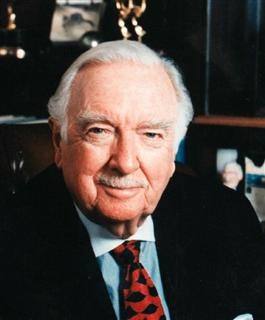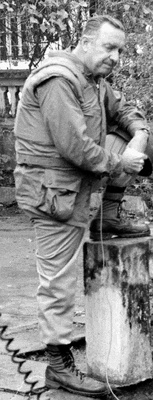 Newsman passed away after a long illness with his family by his side
Newsman passed away after a long illness with his family by his side
THE GREATEST ANCHOR MAN AND JOURNALIST THE U.S.A. AND THE WORLD HAS EVER KNOWN!
Walter Cronkite, the premier TV anchorman of the networks’ golden age who reported a tumultuous time with reassuring authority and came to be called "the most trusted man in America," has died. He was 92.
CBS vice president Linda Mason says Cronkite died at 7:42 p.m. Friday with his family by his side at his home in New York after a long illness.
He was the face of the "CBS Evening News" from 1962 to 1981, when stories ranged from the assassinations of President John F. Kennedy and the Rev. Martin Luther King Jr. to racial and anti-war riots, Watergate and the Iranian hostage crisis.
It was Cronkite who read the bulletins coming from Dallas when Kennedy was shot Nov. 22, 1963, interrupting a live CBS-TV broadcast of the soap opera "As the World Turns."
 Former President George H. W. Bush hailed the former newsman as “a towering, respected figure” in television journalism.”
Former President George H. W. Bush hailed the former newsman as “a towering, respected figure” in television journalism.”
“Many Americans heard it from Walter first that President Kennedy had died, or that man had walked on the moon. He is already missed," Bush said in a statement.
REPORTING FROM THE VIETNAM WAR
Hailed as "the most trusted man in America" during his 18 years as anchor of the "CBS Evening News," Walter Cronkite first gained national recognition for his reporting from the battlefields of World War II.
As a United Press correspondent, Cronkite covered the landings in North Africa and Sicily, the Allied invasion of Normandy and the subsequent battles across France and Germany.
He was also a member of the "Writing 69th," a group of intrepid reporters that accompanied Allied bombers on missions over Germany.
In 1968, while anchor of the "CBS Evening News," Cronkite journeyed to Vietnam to report on the aftermath of the Tet offensive. In a dramatic departure from the traditions of "objective" journalism, Cronkite concluded his reports with a personal commentary in which he voiced his strong belief that the war would end in stalemate.
Cronkite’s editorial would later be regarded as a critical indice of public opinion of the Vietnam War.
ATTENTION READERS
We See The World From All Sides and Want YOU To Be Fully InformedIn fact, intentional disinformation is a disgraceful scourge in media today. So to assuage any possible errant incorrect information posted herein, we strongly encourage you to seek corroboration from other non-VT sources before forming an educated opinion.
About VT - Policies & Disclosures - Comment Policy



